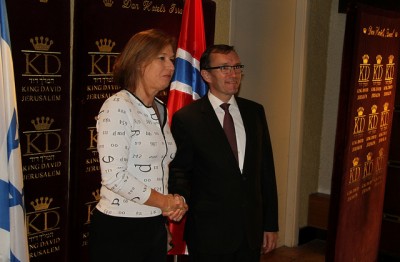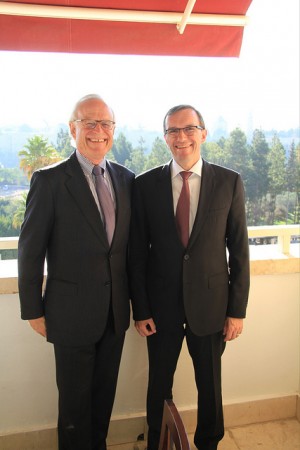UPDATED: An optimistic Norwegian Foreign Minister Espen Barth Eide was back in the Middle East this week to make another attempt at prodding along new peace talks between the Israelis and the Palestinians. Some say he’s far too optimistic, as he tries to push through the two-state solution that was agreed in Oslo 20 years ago. The talks ended up being postponed, after demonstrations at a Palestinian refugee camp on the West Bank that left three Palestinians dead.

“It’s been relatively peaceful on the West Bank recently, so this is a serious event,” Eide told reporters after news of the deadly demonstration broke. He said he had expressed sympathy to Palestinian leaders but would not condemn Israel for its soldiers’ decision to open fire when they felt threatened by Palestinian demonstrators. Three Palestinians were killed and 17 wounded, according to international news agencies. The new round of peace talks was quickly suspended but Eide wouldn’t give up hopes for its outcome. “This is just another example of how important it is that they find a way forward to a real peace,” Eide told Norwegian media. He had earlier said, after meeting with Israeli Justice Minister Tzipi Livni, that he found the new round “extremely encouraging,” adding that “we know that she really believes in a two-state solution,” despite the skepticism surrounding it.
“On the ground and in reality, the two-state solution is dead,” Jørgen Jensehaugen, a researcher specializing in Middle East issues at the Norwegian University of Science and Technology (NTNU) in Trondheim, had earlier told news bureau NTB.
Jensehaugen claims Israel’s politics defy the intention of the negotiations that the US sparked back into a new formal process earlier this month. “While they’re negotiating on a two-state solution, Israel continues to expand its settlements, which in practice makes a two-state solution impossible,” Jensehaugen told NTB.
Questions have long arisen over whether Israel is willing to compromise on issues of borders, the status of Jerusalem, Palestinian refugees’ rights to return home and, not least, its policies allowing ongoing building projects for expanded settlements in Palestinian territory. Israel has greatly expanded its settlements on the West Bank and in East Jerusalem in the years since the Oslo Agreement was reached.
Eide, who comes from the Norwegian Labour Party that also held government power when the Oslo Agreement was negotiated and struck in the early 1990s, is keen to finally see it fulfilled, and told reporters on Sunday before traveling to Israel and the Palestinian territories that it’s “still fully possible” to do so.
“I believe it’s correct and honest of us to say to both sides that either this new round of talks can create the platform to reach the goal, or we have to bury the vision of a two-state solution that was created in Oslo,” Eide told NTB.

In Israel he was meeting with Justice Minister Livni, President Shimon Peres and Deputy Foreign Minister Zeev Elkin. On the Palestinian side Eide was to meet President Mahmoud Abbas and Prime Minister Rami Hamdallah. His formal goal with all of them is to discuss the political situation at present and the status of negotiations for a two-state solution to decades of conflict. The talks are also aimed at preparing for a meeting of donor countries to Palestine that will be held in conjunction with the UN General Assembly in September.
Eide may no longer be foreign minister at that point, if Labour fails to win a third term in government at Norwegian parliamentary elections September 9. Any successor, however, will get the ongoing conflict on his or her plate and need to take over Norway’s longstanding role in it.
Meanwhile, Eide refuses to share the pessimism surrounding the new round of talks. Eide says he believes that Israeli Prime Minister Benjamin Netanyahu “sounds increasingly credible” regarding his own willingness to strike a peace deal, pointing to Israel’s recent release of some Palestinian prisoners. “That wasn’t an especially big sacrifice, but it was a first sign,” Eide said. He said that Netanyahu’s decision to have Livni involved in the process was also “a very good sign.” Livni, for her part, had said the new round of peace talks was “in Israel’s interests” and “good news for Israel, for the Palestinians and for the world.”
Eide hopes Israel will realize how dramatic it can be if the Palestinians don’t get their own state and end up with their territories as part of Israel. That can mean that Israel’s Jewish citizens may no longer be a majority within Israel. Jensehaugen believes Israel, with a one-state solution, then must choose between being a Jewish state or a democratic state.
The new round of peace talks is set to run for nine months.
newsinenglish.no/Nina Berglund

